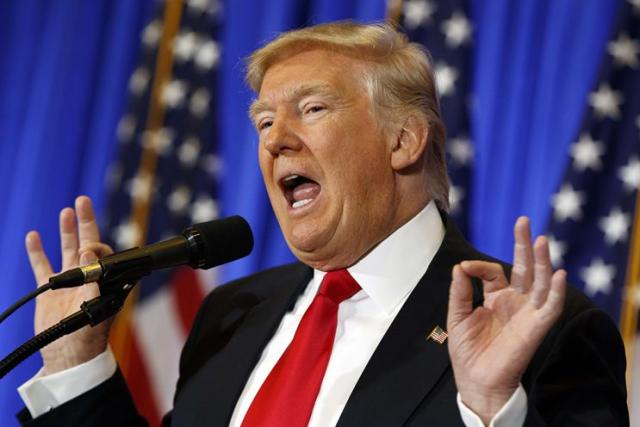The British ex-spy behind the Trump dossier was an FBI asset

President-elect Donald Trump speaks during a news conference in New York on Jan. 11, 2017. (Photo: Evan Vucci/AP Photo)
The man behind the sensational story concerning information the Russian government had supposedly collected about Donald Trump is a former British intelligence operative and was a longtime intelligence source for the U.S. government who had assisted the FBI during an investigation into corruption by FIFA, the world soccer association, according to sources familiar with the matter.
The operative — identified today by the Wall Street Journal as Christopher Steele, a former Russian operations officer for Britain’s MI6 intelligence agency — had worked as a consultant for the FBI’s Eurasian organized crime section, helping to develop information about ties between suspected Russian gangsters and FIFA, said one of the sources, who is directly familiar with Steele’s work.
Steele had been hired originally to investigate Trump by his political opponents, and he decided to share his information with the FBI last year. The preexisting relationship between Steele and U.S. officials is one reason the FBI took the operative’s allegations seriously when he first turned over a written dossier, filled with uncorroborated “raw intelligence” about Trump, to one of the bureau’s agents in Rome last summer, the sources said.
The credibility of some of those allegations is now in question after Trump, at a news conference, denounced the claims as completely false and attacked the news media for circulating them — and the intelligence community for including a two-page summary of the explosive charges in a classified briefing that was given to President Obama, to congressional leaders, and to Trump himself.
“It’s all fake news. It’s phony stuff. It didn’t happen,” Trump said at his Trump Tower press conference Wednesday. “It was gotten by opponents of ours. It was a group of opponents that got together. Sick people, and they got together and put that crap together.”
Steele, who now works for a London-based intelligence firm called Orbis Business Intelligence, was hired by a Washington political research firm working for Democrats looking for damaging material on Trump. After contacting old sources in Moscow, he passed along reports of sensational — and unverified — accounts of compromising material that the Russian intelligence service had supposedly obtained about Trump during his 2013 stay in Moscow, when he was overseeing the Miss Universe contest. “Former top Russian intelligence officer claims FSB [the Russian intelligence service] has compromised TRUMP thorough his activities in Moscow sufficiently to be able to blackmail him,” reads one of the operative’s reports, which was published Tuesday night by BuzzFeed.
The operative’s reports also included multiple other claims that are now in question: One of the operative’s reports alleges that Michael Cohen, a top lawyer in the Trump organization, had met with Russian officials in Prague involved in hacking the election. On Wednesday, Cohen denied he had ever been to Prague and produced his passport to prove it. Another of Steele’s reports, first reported by Yahoo News last September, involved alleged meetings last July between then-Trump foreign policy adviser Carter Page and two high-level Russian operatives, including Igor Sechin — a longtime associate of Russian President Vladimir Putin who became the chief executive of Rosneft, the Russian energy giant. After initially declining to comment, Page wrote a letter to FBI Director James Comey after the story was published denying that he had ever met with Sechin; the Trump campaign, however, cut its ties to him.
Still, U.S. officials said the allegations were not easily dismissed, in part because Steele was a known quantity who had produced reliable information about Russia in the past. “He’s a meticulous professional, and there are no questions about his integrity,” said one U.S. official who has worked with Steele. “The information he provided me [about Russia] was valuable and useful.”
A senior law enforcement official declined to talk about the nature of Steele’s relationship with the FBI. But the official confirmed that he was known to the FBI and that the bureau had already obtained copies of his reports months before Sen. John McCain handed FBI Director James Comey a dossier of Steele’s material in December. Asked why a two-page summary of the uncorroborated reports was included as part of last week’s intelligence briefing on Russian hacking, the official said that “it was an intelligence community decision” to do so after officials learned that his reports had been widely circulating among members of Congress and journalists. “It seemed very clear that these were going to see the light of day in the next couple of weeks,” the official said. The conclusion was that “it might be a good idea to tell [Trump] about them before they were publicly released.”
The official declined to share U.S. officials’ current thinking about the reliability of the material, saying it is still being investigated. “It’s part of the larger look at the Russian influence campaign,” the official said.
Former CIA Director Michael Hayden said the decision to include the material in the briefing was justifiable in light of the expectation that it was likely to leak. “Are you going to tell the guy?” Hayden said, referring to Trump. “You almost owe it to him.” Besides the news media, other intelligence services were likely to get their hands on the material. “It’s awkward, but duty kind of dictates that you tell him.” Still, Hayden added, the rules about what intelligence to share — or not share — appear to be shifting in the Trump era. “We’re off the map here,” he said.
All that begs the question of what the public should make of Steele’s reports, in light of the “hall of mirrors” atmosphere that surrounds much intelligence reporting about the Kremlin. The format of the reports tracks the writings of professional intelligence reports, with each claim tied to a particular source, even if the sources (per standard procedure) are never identified. Steve Hall, a former top Russia operations officer for the CIA until 2015, said he found aspects of Steele’s reports to be credible, especially as they related to the Kremlin’s plans for hacking the U.S. election.
“I find some of it indeed has the ring of truth,” said Hall. But, he added, “other parts of it are problematic.”


Comments
Post a Comment